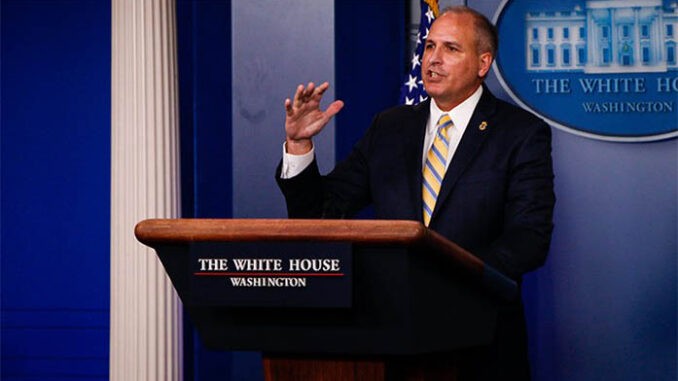
WASHINGTON – Apprehensions at the southern border dropped sharply in August, to just more than 64,000 people, in part because of increased cooperation from Mexican authorities, a Customs and Border Protection official said Monday.
But while apprehensions have fallen by more than half since peaking at 144,255 in May, this August was still higher than the same month in any of the previous five years, according to the latest data from CBP.
Acting CBP Commissioner Mark Morgan on Monday repeated the administration’s call for Congress to fix what he calls broken immigration laws in the U.S., saying “we cannot rely on other countries … to fix our laws,” in particular the asylum process he said is open to abuse by traffickers.
“They’re promising, ‘Hey, you mortgage your home, you give us thousands of dollars, and we’re going to take you on this dangerous trek through multiple countries, we’re going to promise you, because of America’s broken laws, you’re going to be allowed in this country,” Morgan said.
It comes as the surge in migrants has already reached the highest point in at least the last five years. With a month yet to go in fiscal 2019, CBP reported apprehending 926,769 people at the southern border, compared with 521,090 for all of fiscal 2018.
Morgan’s appeal for congressional action came the same day that a federal judge in California reinstated a temporary ban on an administration plan to impose new restrictions on people seeking asylum in the U.S. That plan would have forced migrants from Central America to apply for asylum in the first country outside their own, likely Mexico, before they could apply in the U.S.
In a statement, the White House called the court ruling “a gift to human smugglers and traffickers that undermines the rule of law.” But President Donald Trump, in remarks to reporters Monday, downplayed legal challenges to the administration’s immigration and asylum changes, saying “we’ve won a lot in the courts over the last year.”
He agreed with Morgan that “Mexico has been doing a great job for us, and frankly we’re very appreciative” for their help reducing the number of migrants at the southern border. And he also accused Democrats of not doing enough to fix the problem.
“We’d have total protection if the Democrats would get rid of the loopholes which are there,” Trump said. “They could do it in, as I say 15 minutes if they would get rid of the loopholes and fix asylum. But they don’t want to do that.”
Requests for comment from several Democratic members of the Arizona House delegation were not immediately returned Monday. But in a response to a Department of Homeland Security inspector general’s report last week that was highly critical of the Trump administration’s treatment of migrant children, Rep. Raul Grijalva, D-Tucson, compared the family administration’s family separation policy to “state-sponsored child abuse.”
But Rep. Andy Biggs, R-Gilbert, echoed Morgan’s call for more congressional action, saying in a statement Monday that Congress must “codify permanent deterrents and security measures that will eliminate illegal immigration to the United States.”
Morgan said increased efforts from the Mexican government on both its northern and southern borders have boosted apprehensions in that country from 83,000 in all of 2018 to 134,000 so far this calendar year.
Asked about reports of abuse of migrants waiting in Mexico to have their asylum claims heard, Morgan said the government there has not provided any evidence to corroborate those claims. He blamed the cartels that he said exploit migrants wishing to come to the United States.
While the Mexican government has seen “a substantial increase” in its number of migrant apprehensions this year, Morgan said he wants to see more sustained, long-term efforts from Mexico and the Northern Triangle countries – El Salvador, Guatemala and Honduras.
Asked whether he expects to see such an effort, Morgan expressed skepticism.
“I am concerned whether the government of Mexico, including our partners in Northern Triangle countries, are going to be able to sustain the level of commitment they have,” he said.
